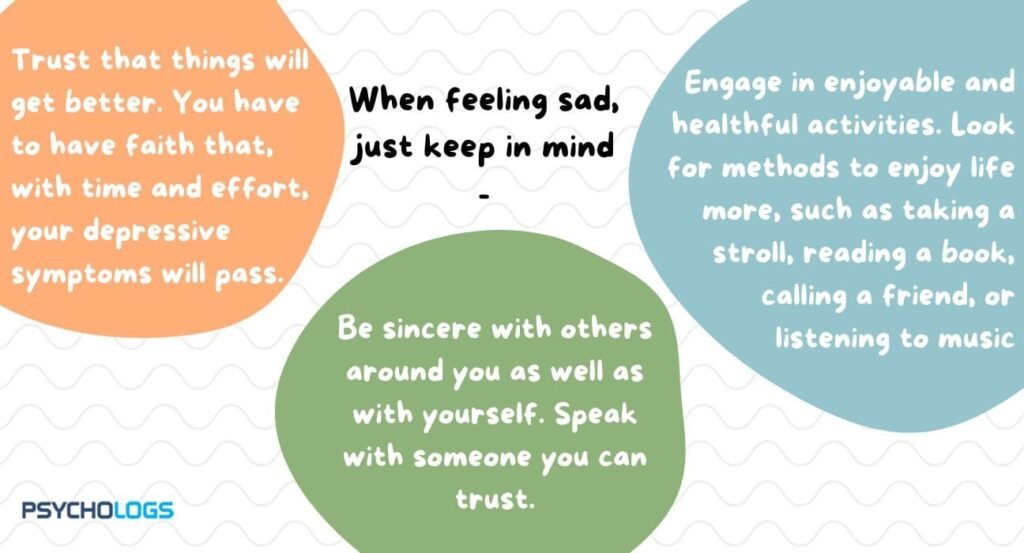Agony, anguish, broken hearts, hurt, sorrow, dejection, dismay, homesickness, distress, and dissatisfaction, are some of the terms we use to describe the emotion of sadness. Any of these feelings might be a reaction to unfavourable or unexpected circumstances or changes in one’s life. Being Sad frequently coexists with other emotions including stress, anger, guilt, grief, worry, or hopelessness. Sometimes these emotions might be so strong that they keep on reminding you of the agony.
What is the feeling of being sad?
Well, it is something that could alter your bodily sensations. you might have trouble sleeping, or you have a headache or stomach ache. Additionally, sadness might alter your emotional state.
Many things might be causing your sadness. Several things in life might make someone feel depressed
- Encountering challenges within the home environment, such as instances of domestic abuse or family discord.
- Encountering difficulties at work or school, feeling under pressure there, moving into a new house, losing a loved one or friend, being sick, providing care for someone unwell, or going through chemical changes in your body (due to puberty, drugs, or medications)
- Noticing changes in your thought patterns, such as adopting self-defeating or counterproductive beliefs, or gaining new insights into topics like terrorism or poverty.
When confronted with these circumstances, you could think negatively or ineffectively about your melancholy. And you can feel worse after thinking about those things. Therefore, use a new strategy: recognize your unhappiness and the circumstances that lead to it. Additionally, give yourself enough time to resolve any issues and become well. But if the issue feels unresolvable, then seek help.
Read More: The Psychology of Happiness
Sadness will Pass

It might take one step or several to feel better. It might occur rapidly or gradually. Just keep in mind that feelings come and go, and you may get over a bad mood and experience something happier. Recognize that you are depressed first. Since grief eventually passes, sometimes it may feel bearable, and expressing your feelings is the best thing you can do.
Read More: Depression: Symptoms, Causes, Types and Treatment
When feeling sad, just keep in mind –
- Trust that things will get better. You have to have faith that, with time and effort, your depressive symptoms will pass.
- Be sincere with others around you as well as with yourself. Speak with someone you can trust.
- Engage in enjoyable and healthful activities. Look for methods to enjoy life more, such as taking a stroll, reading a book, calling a friend, or listening to music
Is there anything you can do to address the root of your sadness?
- Take one issue at a time to solve. Make a list and get started; it doesn’t matter if you start with the largest or smallest issue. If circumstances are beyond your control, discuss your alternatives with a trusted person or make an effort to accept the fact.
- Consider if your food and sleeping habits are healthy for you.
- Assist another person. Being a member of a community or even just making someone else’s life better might make you feel better
- Discover a unique approach to communicating your grief. Keeping a journal, for instance, can assist you in gaining fresh insight.
- Consult a professional (a physician, psychologist, or other health care provider) for assistance. You could want assistance, guidance, or an expert referral.
- Inform your doctor if you experience prolonged sadness after taking a recommended drug.
- Additionally, consult your physician before using any complementary or alternative therapies or over-the-counter pharmaceuticals.
- Be careful for your safety. Tell someone right away if you think you may indulge in self-harming behaviour.
Shame Associated with Sadness
The stigma associated with prolonged sadness and sadness turning into depression can make it challenging for people to ask for support and assistance. Social expectations seek that individuals should always be joyful and resilient, which somewhere makes those who are depressed feel ashamed and alone. Dismantling this stigma and fostering a welcoming atmosphere where people feel free to express their feelings and ask for assistance when they need is crucial.
How can Sadness be a Motivator for Personal Growth?
Sadness may be a driving force behind personal development since it encourages people to consider their feelings, past experiences, and current situations. According to research, feeling sad up to a certain limit can have positive effects on one’s motivation, interpersonal skills, and cognitive abilities that support personal growth. People can benefit from this emotional state when they accept their melancholy and utilize it as a springboard for reflection and personal development. A significant way that sorrow may spur human development is by increasing self-awareness. Sad people typically focus on their relationships, ideals, and aspirations, which helps them have a better knowledge of who they are and what they need.
Read More: 10 Best Books to read for Personality Development in 2024
Furthermore, seeking reasons for sadness motivates people to look for social support and a connection with others, which promotes emotional development and resilience. People may improve their social ties, create coping mechanisms, and foster a feeling of community by asking for assistance when they’re feeling down. Seeking assistance not only helps manage the mood but also fosters personal growth by improving social skills and emotional intelligence.
Related: The Psychology of Resilience in Plague Paintings
Sadness may also serve as an internal source of inspiration for development and progress. People who face the challenges that are followed by low mood might grow more resilient, determined, and have a greater sense of purpose in life. This internal motivation may inspire people to make positive changes in a variety of areas of their lives, including setting new objectives and pursuing chances for personal growth.
Essentially, people may use sorrow as a motivator to promote self-awareness, seek assistance, and encourage intrinsic growth if they accept and acknowledge it as a normal part of the human experience. Sadness may be a potent driver for human growth and transformation through this process of reflection, interpersonal connection, and internal drive.
In conclusion, people may regulate their emotions and find solace during trying times by using a variety of coping mechanisms and support networks. It’s acceptable to be sad up to a certain extent until it gets severe and turns into a disorder like depression. Understanding the stigma associated with depression and its causes can help us build a more accepting and compassionate society where people are at ease expressing their feelings and asking for assistance when they need it.
References +
- Kahn, J., Ladd, K., Feltner-Williams, D. A., Martin, A. M., & White, B. L. (2021). Regulating sadness: Response-independent and response-dependent benefits of listening to music. https://www.semanticscholar.org/paper/Regulating-sadness%3A-Response-independent-and-of-to-Kahn-Ladd/0ecef59a775fca29b2628b468e8cc65e328503d1
- Yildirim, E. T., & Atar, A. (2023). METHODS OF COPING WITH SADNESS IN ISLAMIC ETHICAL PHILOSOPHERS. https://www.semanticscholar.org/paper/METHODS-OF-COPING-WITH-SADNESS-IN-ISLAMIC-ETHICAL-YILDIRIM-Atar/5c88488ee1c13f0e08921aad260518e776f2f8d4
- https://link.springer.com/content/pdf/10.1007/s12144-023-04518-z.pdf













Leave feedback about this